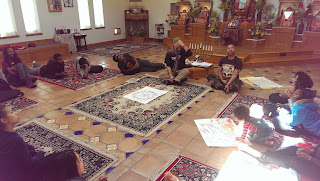By
Alexa Giambra

Meet Leslie Lanes, a long time mediator and a recent restorative justice practitioner who has been in women’s circles for many years. She currently lives in Southern Oregon with her husband. Leslie is also an avid ping pong player and even plays in an all-men’s club! She is interested in connecting with the land, and is the proud steward of an organic garden. While she had previously lived in an intentional community, she says, the same values of connection and communication in a relationship still apply whether it be in a workplace, a family, a school classroom or a community. Leslie’s work in the areas of restorative justice and mediation have allowed her to bring her community together and connect with them on a personal level.
One such project took flight when she and a group of women came together hoping to provide a positive impact on teenage girls. Since she had been a part of women’s circles in the past, she believed that younger women should also be given the opportunity to have this experience - to use their voices, to come to know themselves, to learn to embrace diverse points of view, to feel their own sovereignty. In 2006, she founded The Rose Circle, where young women would ultimately make the decisions about how they want their circle to be with the help of adult women mentors. Lanes believes this concept teaches not only empowerment to the girls, but it also displays how the mentors aren’t there to impose on their conversation. Rather, they are there to listen, ask questions, encourage conversation and be curious.
The circles have expanded over time to include men and boys calling for a name change in 2015 to the reimagined “Rogue Valley Mentoring”. Adults volunteer their time to be trusted mentors for the children - different from a parent, a coach or a teacher. As a Mediator, Leslie has worked with different relationships where there is conflict - husbands and wives, parent and child, employer and employee. While mediating between parents and teenagers, she saw how often the parent lacked the skills to listen deeply to their child and instead reacted from their own childhood wounds. Leslie’s vision is for all people to learn these skills through being in a circle or taking training so that they can have healthy relationships with their family and peers. Having a mentor is another way for youth to see modeled a way of being that is strength-based. ”If I can assist in bringing some understanding between individual people, then I feel like I’m contributing to bringing peace to the world in some small way”, said Lanes, who also believes that mentorship should be a part of our education system.

As mentioned previously, Lanes has recently found her passion in restorative justice, and is finding ways to spread that throughout her community. She is fostering “elder circles” in which three women provide a space for young girls who have gotten into trouble. The catch is, that rather than harshly punishing them or frowning upon them, they go through a restorative process where they learn to become better citizens of the community. Lanes points out that there is a ripple effect to a person’s actions. While many people may not be aware of this, our actions actually affect a much larger group of people than we may think. In these circles, the girls come to realize the harm they have caused and the impact of that harm. They then find ways to make a positive change, such as doing community service or issuing an apology. Rather than locking them up or expelling them from school, they learn about the impact that their actions had, they learn to take responsibility for their actions and are then welcomed back into the community with their confidence restored. The girls then get to meet with the three women in the “elder circle”, where the women actively listen to what the girls have to say about their process and how the experience has made a difference in their life. Particularly noteworthy is the last round where ‘appreciation’ is expressed to the girl for what the women have learned about her in the short span of time they have been with her in the circle. Lanes has encountered many girls who have never in their lives received this much appreciation before, where perhaps they haven’t been listened to so intently “Instead of ostracizing youth who have done harm and calling them out, it’s a way of calling them in,” says Lanes, who aims to assure the girls that there is a place for them in the community, and that they are not alone.














